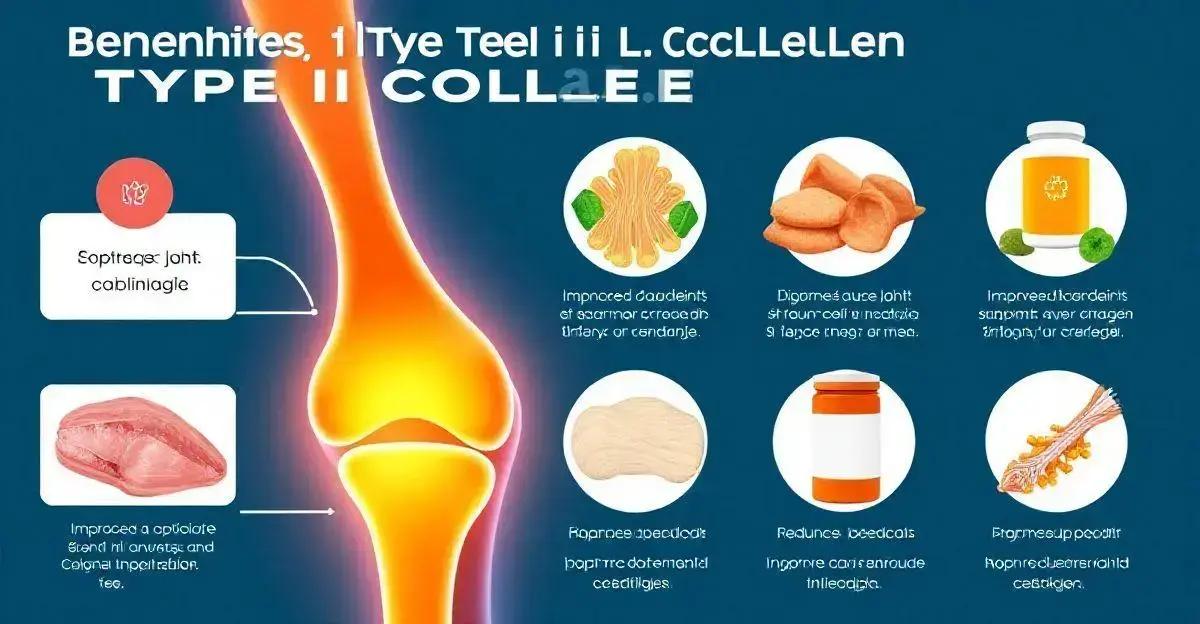Type II collagen supplements are vital for joint health, offering benefits like pain relief, improved mobility, and better cartilage health, especially for those with joint pain or stiffness. While dietary sources such as bone broth and chicken are helpful, supplementation may be necessary for specific health needs. It’s important to consult healthcare professionals before starting any new supplement to ensure safety and effectiveness.
Type II collagen is a crucial protein primarily found in cartilage, making it essential for joint health and functionality. Understanding its role and benefits can help you make informed decisions about your nutrition and supplementation. In this article, we will explore the benefits of Type II collagen, its dietary sources, and how it supports overall joint health.
What is Type II Collagen?
Type II collagen is a specific type of collagen predominantly found in cartilage, which is the flexible connective tissue that cushions joints. This type of collagen is essential for maintaining the structure and function of cartilage and plays a vital role in joint health.
1. Composition: Type II collagen is made up of amino acids, including glycine, proline, and hydroxyproline. These amino acids form a unique triple helix structure that provides strength and resilience to cartilage tissues.
2. Location in the Body: Type II collagen is primarily located in the articular cartilage that covers the ends of bones in joints, as well as in the cartilage of the spine, rib cage, and nose. It is crucial for maintaining the integrity and elasticity of these tissues.
3. Function: Type II collagen provides support and cushioning to joints, allowing for smooth movement and reducing friction between bones. It also helps maintain the overall structure of cartilage, contributing to joint stability.
4. Importance for Joint Health: Adequate levels of Type II collagen are essential for preventing joint degeneration and conditions such as osteoarthritis. As we age, the natural production of Type II collagen decreases, leading to a decline in cartilage health and increased joint pain.
5. Dietary Sources: While Type II collagen is most commonly found in animal cartilage, it can also be obtained through dietary sources such as bone broth and certain supplements that specifically contain Type II collagen.
In summary, Type II collagen is a vital protein for joint health, primarily found in cartilage. Understanding its role and importance can help individuals make informed choices about their nutrition and supplementation to support joint health and overall well-being.

The Role of Type II Collagen in Joint Health
Type II collagen plays a critical role in maintaining joint health, as it is the primary collagen found in cartilage, which is essential for proper joint function. Here’s how Type II collagen contributes to joint health:
1. Cushioning Joints: Type II collagen provides structural support to cartilage, helping to cushion the ends of bones in joints. This cushioning effect helps absorb shock and reduces friction during movement, allowing for smoother joint function.
2. Maintaining Cartilage Integrity: Healthy levels of Type II collagen are essential for the maintenance and repair of cartilage. It helps preserve the elasticity and resilience of cartilage, preventing degeneration and protecting against wear and tear.
3. Reduction of Joint Pain: Adequate Type II collagen levels can help alleviate joint pain, particularly in individuals suffering from osteoarthritis. By supporting the health of cartilage and reducing inflammation, Type II collagen can lead to improved comfort and function.
4. Improved Joint Mobility: By maintaining the health and integrity of cartilage, Type II collagen enhances overall joint mobility. This increased flexibility allows for smoother movements and can improve performance in physical activities.
5. Support During Recovery: Type II collagen plays a significant role in the healing process of joint injuries. By promoting tissue repair and regeneration, it aids in recovery and helps restore joint function after injury.
6. Long-Term Joint Health: Regular intake of Type II collagen may help maintain healthy joint function over time. By supporting cartilage health and reducing the risk of degeneration, Type II collagen can contribute to long-term joint health and mobility.
In summary, Type II collagen is essential for joint health by providing cushioning, maintaining cartilage integrity, reducing pain, and improving mobility. Incorporating Type II collagen into your diet or supplementation can significantly benefit joint function and overall well-being.
Benefits of Type II Collagen Supplements
Type II collagen supplements offer a range of benefits, particularly for joint health and overall well-being. Here are some key advantages of incorporating Type II collagen supplements into your health regimen:
1. Joint Pain Relief: Type II collagen supplements have been shown to reduce joint pain, especially in individuals suffering from osteoarthritis and rheumatoid arthritis. By supporting cartilage health and reducing inflammation, these supplements can lead to improved comfort and function.
2. Improved Joint Mobility: Regular supplementation with Type II collagen can enhance joint flexibility and range of motion. Many users report increased ease of movement, allowing for more active lifestyles.
3. Supports Cartilage Health: Type II collagen is a key component of cartilage. Supplements can help maintain and repair cartilage integrity, preventing degeneration and protecting against wear and tear.
4. Enhanced Recovery from Injuries: Type II collagen plays a significant role in the healing process of joint injuries. It helps promote tissue repair and regeneration, aiding in faster recovery and restoration of joint function.
5. Long-Term Joint Health: Regular intake of Type II collagen supplements may help maintain healthy joint function over time. By supporting cartilage health, these supplements can contribute to long-term joint health and reduce the risk of future joint problems.
6. Convenient Source of Nutrients: Type II collagen supplements provide a concentrated source of collagen, making it easier to ensure adequate intake without having to consume large amounts of collagen-rich foods.
7. Supports Skin Health: While primarily known for joint benefits, Type II collagen may also contribute to skin health by promoting elasticity and hydration, helping to reduce the appearance of wrinkles.
In summary, Type II collagen supplements provide numerous health benefits, including joint pain relief, improved mobility, support for cartilage health, and enhanced recovery from injuries. Incorporating these supplements into your daily routine can significantly benefit joint health and overall quality of life.

Dietary Sources of Type II Collagen
Incorporating dietary sources of Type II collagen into your diet is essential for supporting joint health and overall well-being. Here are some key sources of Type II collagen:
1. Bone Broth: Bone broth is one of the richest sources of Type II collagen. Made by simmering animal bones and connective tissues, it releases collagen along with other beneficial nutrients. Bone broth can be consumed as a warm beverage or used as a base for soups and stews.
2. Chicken: Chicken, particularly the skin and cartilage, is high in Type II collagen. Consuming dishes that include chicken skin or using parts like chicken wings and feet can increase your intake of this essential protein.
3. Turkey: Similar to chicken, turkey also contains Type II collagen, especially in the skin and connective tissues. Including turkey in your meals can provide additional collagen support.
4. Fish: Certain types of fish, especially those with skin, such as salmon and mackerel, contain collagen. Marine collagen is often more bioavailable, making it easier for the body to absorb and utilize.
5. Gelatin: Gelatin, derived from collagen, is another source that can contribute to your collagen intake. It is commonly used in cooking and baking, especially in desserts, and can be added to smoothies or soups.
6. Organ Meats: Meats such as liver and other organ meats contain collagen and are nutritious options that can help support overall health, including joint function.
7. Collagen Supplements: While not a traditional food source, collagen supplements are a concentrated source of Type II collagen. They are available in various forms, including powders, capsules, and liquid formats, making it easy to boost your intake.
In summary, dietary sources of Type II collagen include bone broth, chicken, turkey, fish, gelatin, organ meats, and collagen supplements. Incorporating these foods into your diet can help support your body’s collagen production and promote joint health.
How to Incorporate Type II Collagen into Your Diet
Incorporating Type II collagen into your diet can be a straightforward process that enhances your joint health and overall well-being. Here are some effective ways to include Type II collagen in your daily meals:
1. Bone Broth: One of the richest sources of Type II collagen, bone broth can be consumed as a warm beverage or used as a base for soups, stews, and sauces. Consider making homemade bone broth by simmering animal bones and connective tissues for several hours or purchasing high-quality pre-made bone broth.
2. Cook with Chicken and Turkey: Incorporate chicken and turkey into your meals, especially the skin and cartilage, which contain Type II collagen. You can roast, grill, or add these proteins to salads, soups, and casseroles.
3. Include Fish in Your Diet: Eating fatty fish, particularly those with skin like salmon and mackerel, can provide Type II collagen. Aim to include fish in your diet a few times a week for both collagen and omega-3 fatty acids.
4. Use Gelatin in Recipes: Gelatin, derived from collagen, can be added to various recipes. Use it to make homemade gummies, desserts, or as a thickening agent in soups and gravies. You can also dissolve gelatin powder in smoothies or yogurt.
5. Add Collagen Supplements: Consider using collagen supplements, particularly those that contain Type II collagen. These are available in powder or capsule form and can be easily added to smoothies, coffee, or water. Look for high-quality supplements that provide clear sourcing and formulation information.
6. Enjoy Organ Meats: Incorporating organ meats, such as liver, into your diet can provide collagen and other essential nutrients. While not everyone’s preference, organ meats can be a nutritious addition when prepared properly.
7. Mix with Other Nutrient-Rich Foods: Pair Type II collagen sources with foods rich in vitamin C, such as citrus fruits, bell peppers, and berries. Vitamin C is essential for collagen synthesis and can enhance the effectiveness of collagen in your diet.
In summary, incorporating Type II collagen into your diet can be achieved by consuming bone broth, chicken, turkey, fish, gelatin, and organ meats, as well as by taking collagen supplements. By making these dietary adjustments, you can effectively support your body’s collagen production and promote joint health.

Consulting with Healthcare Professionals for Supplementation
Consulting with healthcare professionals before starting any supplement regimen, including Type II collagen, is essential for ensuring safety and effectiveness. Here are some important considerations for seeking professional guidance:
1. Personalized Recommendations: Healthcare professionals can provide tailored advice based on your individual health profile, dietary habits, and specific joint health needs. They can help determine if Type II collagen supplements are appropriate for you.
2. Assessing Nutritional Gaps: A healthcare provider can assess your diet and identify any nutritional deficiencies that Type II collagen supplementation might help address, ensuring that you choose a supplement that effectively meets your needs.
3. Monitoring for Side Effects: If you decide to take Type II collagen, your healthcare provider can help monitor any potential side effects or adverse reactions, allowing for timely adjustments to your regimen.
4. Interactions with Medications: Some supplements can interact with prescription medications, potentially affecting their efficacy or causing side effects. Informing your healthcare provider about all supplements and medications you are taking can prevent harmful interactions.
5. Guidance on Dosage: Healthcare professionals can recommend the appropriate dosage of Type II collagen based on your age, weight, health status, and specific needs, ensuring you receive the right amount without risking overconsumption.
6. Exploring Alternatives: If Type II collagen is not suitable for you, healthcare professionals can suggest alternative strategies for managing joint health, including dietary changes, physical therapy, or other supplements that may be more appropriate.
In summary, consulting with healthcare professionals before using Type II collagen supplements is essential for making informed decisions about your health. Their expertise can guide you toward the best choices for your individual needs and ensure that you achieve optimal health outcomes.
Conclusion
In conclusion, consulting with healthcare professionals before starting any new supplement regimen, including Type II collagen, is vital for ensuring safety and effectiveness.
Personalized guidance from qualified providers can help you identify nutritional needs, assess potential interactions with medications, and monitor for any side effects.
By prioritizing professional advice, you can make informed decisions about incorporating Type II collagen into your health routine.
Whether you have specific dietary restrictions, health conditions, or simply want to enhance your joint health, healthcare professionals can help you achieve your health goals safely and effectively.
Taking proactive steps toward understanding your health and seeking professional advice will empower you to make the best choices for your joint health and overall well-being.
FAQ – Frequently Asked Questions about Type II Collagen Supplements
What is Type II collagen?
Type II collagen is a specific type of collagen primarily found in cartilage, which is essential for maintaining joint health and function.
What are the benefits of Type II collagen supplements?
Type II collagen supplements can help reduce joint pain, improve mobility, support cartilage health, and promote recovery from joint injuries.
How can I incorporate Type II collagen into my diet?
You can incorporate Type II collagen by consuming bone broth, chicken, turkey, fish, and gelatin, as well as taking collagen supplements.
Are there any side effects associated with Type II collagen supplements?
While generally safe, some individuals may experience digestive discomfort or allergic reactions. It’s important to consult a healthcare professional before use.
Who should consider taking Type II collagen supplements?
Individuals experiencing joint pain, stiffness, or those with osteoarthritis may benefit from Type II collagen supplements. Consulting a healthcare provider is advisable before starting any new supplement.
Can I get enough Type II collagen from my diet?
While dietary sources like bone broth and certain meats provide Type II collagen, supplementation may be necessary for those with higher needs or specific health conditions.


